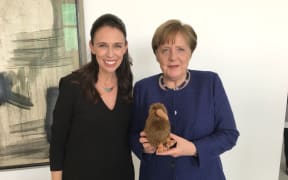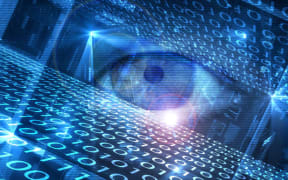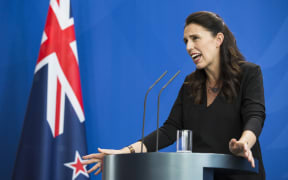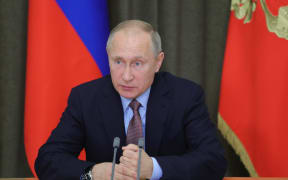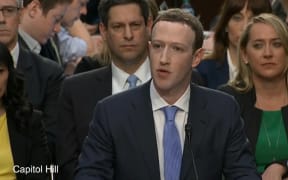New Zealand's spy agencies have had to take action to stop hacking attacks by foreign powers from doing harm here, Prime Minister Jacinda Ardern says.
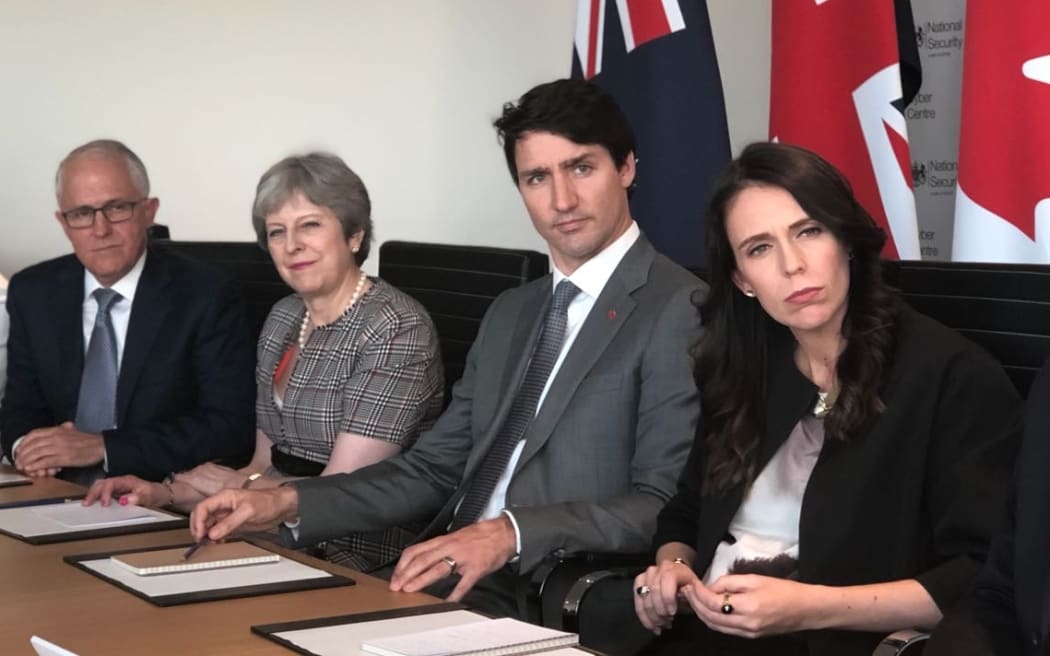
Leaders from four of the Five Eyes nations - Australia's Malcolm Turnbull, Britain's Theresa May, Canada's Justin Trudeau and New Zealand's Jacinda Ardern - meet in London. Photo: Pool
The Prime Minister is in London for meetings with European leaders, and joined a meeting of the Five Eyes countries today.
Russia has this week been identified by the United States, the United Kingdom and Australia as being behind hacking attacks targeting internet infrastructure.
Speaking after the meeting, Ms Ardern talked about hacking attacks made against New Zealand by state actors, or sponsored by state actors.
She echoed the comments made by GCSB director Andrew Hampton yesterday noting that of the 396 serious hacking incidents the bureau identified last year 122 as having markers pointing to them being by foreign states.
"We continue to take those on a case-by-case basis," she said.
"What's important is that we continue to be agile enough to respond and prevent harm being done, but there is no doubt that Russia is a part of that."
She said New Zealand had already moved to prevent such hacks from doing damage both domestically and overseas.
"We've already had a solid basis of action in New Zealand, we use the information we have to make sure that those technical advisories are shared with those who need to know so that they're able to pre-empt the damage that can be done by these cyber attacks.
"So that's enabled us as a country to take action that's prevented harm being done and we'll keep doing that."
She would not say whether New Zealand had been specifically affected by the Russia hack noting only that there had been one recent threat linked to Russia, likely referring to the NotPetya attack which international partners have attributed to the Russian government.
"We've been very specific about the ... cases where we have directly attributed [hacks to state actors] and there has been a case this year where there has been action about a particular cyber threat, and in the past there's also been attribution by others around a North Korean threat.
"We have been in a place to take preventative action and I think that speaks to the role that our cyber security agencies play but also their contact with those that might be affected.
"We do have to make sure that we continue to be vigilant because prevention will always prevent some of that harm.
"There's only been a few rare cases for any of us actually to make direct attribution to particular countries over them."
Five Eyes leaders speak about threats from Russia
Ahead of the meeting, the UK Prime Minister Theresa May said Russia was using cyber attacks as part of a wider effort to attack and undermine the international system.
"The co-operation between our nations allowed us to trace February's NotPetya hack to Russia," she said.
"Russia is using cyber as part of a wider effort to attack and undermine the international system ... its interference over the past year has included attacks on the public sector, media, telecommunications and energy sectors."
Mrs May said Russia was using misinformation campaigns to distort the truth of what happened in chemical weapons attacks in Salisbury and in Syria.
"I have been clear to Russia that we know what it is doing. And we should be in no doubt that such cyber warfare is one of the great challenges of our time," she said.
Her Australian counterpart Malcolm Turnbull said illegal conduct from Russia could not be tolerated.
"Whether it is a chemical attack in Syria, the use of a nerve agent on British soil, or the expanding cyber attacks across the internet ... these must be resisted, they must be protected, they must be identified," Mr Turnbull told the meeting.
Mr Turnbull said businesses and governments needed to step up their cyber security, especially as many hacks were the result of sloppy practices.
"The level of cyber attacks is so high, at any given time, that it is always present," he said.
Canadian Prime Minister Justin Trudeau said the four nations, who along with the United States make up the Five Eyes security alliance, stood in solidarity with the UK.
"One of the things that we recognise is there are folks out there in the world, countries out there in the world who do not share our values and our approach to freedoms and a rules based order ... we recognise the arrival of new threats as we get more and more digital, as we develop AI [artificial intelligence].
After the meeting, Ms Ardern said the meeting had been useful.
"For those of us who are here of Five Eyes to gather together to catch up, particularly on issues we've seen in the public domain.
"You would have gleaned from the beginning of the meeting where we acknowledged we do need to focus on enforcing rules-based order and that we cannot allow the use of chemical weapons to go unanswered."
She said they also condemned the use of chemical weapons, and wanted to see a strong international response.
"To make sure that we take a multi-lateral response to the use of chemical weapons. In this case obviously the veto power stopped that from being possible but from here you can see a mood from all of those involved that we return to that order.
She refused to say more about what the leaders had spoken about during the meeting. US President Donald Trump did not attend the talks.
